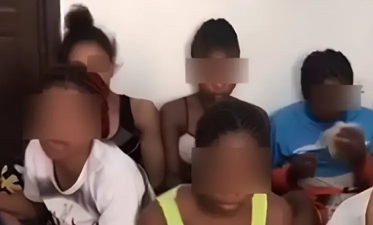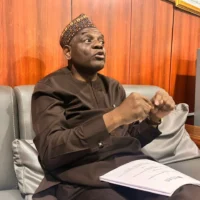Cajoled by fake promises of high-paying professional jobs in Ghana, teenage girls and young men from Nigeria have continuously fallen prey to traffickers disguising as ‘agents’. Once in Ghana, the young men find themselves trapped as criminal gang members involved in nefarious activities while teenage girls are forced to meet daily ‘prostitution’ targets, ALAO ABIODUN writes.
When 17-year-old Precious Beatrice (not real names) left the shores of Nigeria for Ghana with the promise of enticing and alluring offers, she had no inkling she would be warming the beds of strangers for a meager fee.
Despite the intensified efforts to curb and tackle human trafficking and most importantly, the global commitments to eliminate human trafficking by 2030, the challenge remains huge.
For Precious, her post-recovery phase after her rescue by authorities has been plagued with emotional and physical, challenges. She’s being haunted by her terrible experience.
Her encounter with her traffickers began two years ago when she was referred to an ‘agent’ who promised to connect her and some other girls with someone in Ghana to get her a high-paying job which could change her life and free her from her predicament.
Precious’ story is sad but not unusual. The “enticing job offer” gimmick is a usual recruitment tactic used to traffic women for sexual exploitation.
The events that followed the boat trip from Nigeria to Ghana through the coastline were both dreadful and tragic. Precious and other survivors said the transport experience was life-threatening with no safety for their lives, especially the absence of life jackets while on water trip.
Precious was able to make it to the final destination, but she recounted how some victims were made to board rickety boats, encountering stormy weather conditions which constitute serious hazard to human lives.
As Precious was going deep into her story, her voice trembled in reflection of the agony she went through. The abuse she endured is the common fate of many Nigerian girls who go to Ghana illegally, especially teenagers.
Other survivors said they fell prey to trafficking by trusting known persons (agents). They lamented that their desperation to seek greener pastures were exploited by the traffickers who made mouth-watering promises of high-paying jobs.
What the law says
Twenty-one years since the Palermo Protocol was adopted as a global mobilisation tool to combat human trafficking, West Africa has long been characterised by high levels of intra and extra-regional migration.
The West African region is recognised to produce some of the highest numbers of trafficking victims in destination countries outside Africa, especially in Europe and the Middle East.
Nigeria, in 2015, enacted the Trafficking in Persons (Prohibition) Enforcement and Administration Act, which outlawed all acts of human trafficking in the country.
The Act prescribes five to 10 years imprisonment and a fine of N1 million for the trafficking of children, depending on the purpose of such trafficking.
For Ghana, the government increased anti-trafficking law enforcement efforts. The 2005 Human Trafficking Act, amended in 2009, criminalised sex and labour trafficking.
The Human Trafficking Act prescribed penalties of a minimum of five years’ imprisonment, which were sufficiently stringent and, with respect to sex trafficking, commensurate with those prescribed for other grave crimes, such as rape.
However, the 2015 regulations for this Act, which are non-discretionary and have the force of law, provided specific guidance on sentencing depending on the circumstances. In general, the term is not less than five years’ imprisonment and not more than 25 years. But if a parent, guardian or other persons with parental responsibilities facilitates or engages in trafficking, they are liable to a fine, five to 10 years imprisonment or both.
Checks by our correspondent revealed that the Elubo Central Command Border Post is the main border crossing along western border of Ghana with Cote d’Ivoire. However, there are a number of unapproved routes along the border that people use to cross illegally, including a river.
The main border post along Ghana’s eastern border is at Aflao, which is located directly across the border from Togo. There are a number of unapproved border crossings north of Aflao used by human traffickers to cross over to Togo.
Because of the increased rate of trafficking, the Ghana Immigration Service (GIS) established the Anti-Human Trafficking Desk in Accra in 2010, and recently established desks at three major border crossings – Aflao, Paga and Elubo.
Victims recall ordeal
“When we got to Ghana where we reached our madam’s house, she said we were going to be doing some jobs for her, but we did not know that she would take us to a prostitution house where we would be paying her daily,” said a survivor.
According to Africa Organised Crime Index 2023, Ghana is used as a transit point for West Africans, who are often destined for sex trafficking in Europe. Major cities such as Accra, Kumasi and Takoradi, as well as border areas of Elubo, Aflao, Bawku and Bolgatanga, are hotspots for this crime.
Ghana, being one of the more stable and economically attractive countries in the region, acts as an important transit and destination country for irregular migrants.
Eight young Nigerian girls were recently rescued from human traffickers in Ghana by the National Agency for the Prohibition of Trafficking in Persons (NAPTIP) in collaboration with Nigerians in Diaspora Commission (NIDCOM). The rescued girls were trafficked to Ghana for prostitution.
The girls, between the ages of 15 and 22, were from various states across Nigeria. They were lured to Ghana under false promises of employment but were forced into sexual exploitation. Some of these teenagers hail from various states across Nigeria, including Ebonyi, Akwa-Ibom, Imo, Plateau, and Cross River.
Also in July 2024, 58 Nigerian women and children were rescued from human traffickers in Ghana. The trafficker, a Nigerian, receive 200 – 300 Ghana Cedis daily as proceeds from the girls’ prostitution.
Narrating her ordeal, Precious said: “The man (Ebuka) took us to Mazamaza, that’s the place we entered a boat. The boat led us to meet one Chukwudi in Togo, and we thought the Togo was in Lagos. He even told us that if we encountered security agents (Navy) on water, we should say we were going to Togo.
“True to his words, we met security agents and they asked us where we were going. We told them we were going to Togo, and they let us go.
“When we crossed the water after a day and a half, we finally got to his house. When we arrived, he gave us food. The next day, he took us to a herbalist’s place.
“We asked what we were doing there and he said we had to take an oath so that we won’t steal his money because we came to work as sales girls. So we took an oath.
“The man’s wife came out and gave us a wrapper to tie; she also gave us a bra and pants to wear.
“We asked what we were doing there and what we were doing with the pants, and the woman said we came for prostitution work. She said we had no other option. So we started crying.
“She said we would be paying 300 Cedis everyday for good three months, and if we did not pay, we were going to die or run mad, and that we should remember that we took an oath.”
Another survivor said: “Yes, I am 18. I wanted to come to Ghana because I was told I would work at a hair salon. But as soon as I arrived, I foun that none of it was real. The job was a lie.
“They forced me to become a prostitute. That was the only way to pay off the debt from the journey, which they had told me before I left that I did not need to pay for.”
Conviction
Several persons have been convicted of trafficking across the country.
One of the traffickers, a 28-year-old Nigerian, Favour Ugwu, was arrested and jailed for eight years by a Ghanaian court. In the judgment delivered by Her Honour Akosua Adjepong, Ugwe was also ordered to pay GH¢5,000 to her 19-year-old victim as compensation.
According to Ghana-based news website Star FM, the court found the woman guilty of recruiting and forcing the Chadian teenager into prostitution in the West African country.
Adjepong, before delivering the judgment, said she considered Ugwe’s lack of remorse during the trial and the prevalence of human trafficking in the country before passing her sentence.
The convict admitted to recruiting the victim from Abuja with the help of an accomplice who paid for her transportation to Ghana.
An electrical engineer, Ibrahim Yahaya, reported Ugwe to the anti-human trafficking unit at the CID headquarters on November 5, 2023, after the victim was stranded in the neighbourhood at Olonka behind Madina Redco Flat in Accra.
The Chadian girl said she was recruited and transported from Nigeria to Ghana by Ugwe to work in a restaurant but was instead forced into prostitution.
While receiving eight young Nigerian girls who were recently rescued from human traffickers in Ghana, NiDCOM Chairman/CEO Abike Dabiri-Erewa said: “We thank God some of you are back home, and that is good news. But the bad news is that there are so many people trapped there. So be happy that you are back home.
“We are going to ensure that you’re properly rehabilitated and hopefully you will tell your stories so that other girls will not fall into the same trap.
“One thing is consistent about the traffickers: they will lie to yu that once you take an oath, you will run mad. And that is a lie. We will collaborate with your various state governments and NAPTIP to ensure you’re properly rehabilitated.
“They (trafficked girls) were all tested. Four who tested positive to HIV are receiving treatment and will return subsequently.”
Their handover is to ensure they are safe pending rehabilitation and reintegration with their families.
Dabiri-Erewa noted that there are still many more trafficked victims waiting to be rescued and thanked the Ghanaian security agencies for their cooperation.
Trafficked males forced to join gangs
For experts, it appears that victims of forced labour are more likely to be trafficked through official border control points while victims of trafficking for sexual exploitation are trafficked through unofficial and illegal border control points.
Enticed by false promises of well-paid professional jobs in Ghana, a male victim (names withheld) and 10 other young men from Nigeria were scammed by e-traffickers. Once they landed in Ghana, they found themselves trapped by a criminal gang and forced to meet daily ‘cyber-crime’ targets or face the wrath of the gang leaders.
The male victim had dreamt of becoming a software developer, but on arrival in Ghana, he realised that the “friend” he had met virtually was actually a trafficker, who handed him over to the ‘boss’; a scary and abusive man.
After seizing his personal documents, belongings and valuables, the criminals forced the male victim to work for long hours locked in a warehouse with tight security alongside others who, like him, had fallen for the promise of a better life.
War against traffickers
Trafficking in West Africa often shows age and gender patterns. A recent research by the United Nations Office on Drugs and Crime (UNODC) revealed that more than 75% of trafficking victims detected in West Africa are children and teenagers.
So far, the activities of Nigerians in the Diaspora Commission are commendable. NAPTIP on its part said it had stepped up its efforts with a 24-hour all-hands-on-deck approach to all cases of trafficking in persons.
The cartels of human traffickers continue to change tactics and explore counter-measures to flourish in their anti-human enterprise.
In August 2021, the Nigerian police arrested two human traffickers and rescued 10 Nigerian girls about to be airlifted from Cotonou, Republic of Benin, to the United Arab Emirates. The police got an intelligence report from a non-governmental organisation with support from the country and later handed the girls over to NAPTIP.
The syndicate was reportedly based in Dubai, with some of its agents in Nigeria and Cotonou.
Reintegration for survivors?
Rehabilitation is a core component of Nigeria’s anti-trafficking policies. But sadly, only limited efforts have been made to assess these programmes and whether they strongly and positively help survivors in Nigeria back on their feet.
Nigeria’s rehabilitation programmes target the immediate, ongoing and long-term needs of people who have been trafficked. Their goal is to facilitate physical and mental recovery, empowerment and social inclusion.
Providing survivors with shelter, personal hygiene products, physical health care, mental health care and counselling are involved. Legal counsel, education, vocational training and employment are also part of the rehabilitation process.
Last year, the International Organisation for Migration (IOM) launched the Enhanced Reintegration for Survivors of Trafficking (ERS) project; an initiative aimed at empowering survivors of trafficking in Ghana and Nigeria through enhanced reintegration support.
Recognising the critical need to address the long-term challenges and risks faced by survivors of trafficking, the ERS project has been developed to offer survivors of human trafficking the necessary tools and resources to foster economic security, while also providing comprehensive support across various dimensions of their reintegration journey.
Trafficking remains a pervasive and heartbreaking issue in Nigeria. But there are efforts by non-governmental organisations to combat the menace.
NAPTIP statistics from 2019 to 2022 indicate that 61 per cent of human trafficking in Nigeria happens internally, while 39 per cent is from cross-border.
In most cases, internal trafficking takes the form of recruitment and transportation of children from rural areas to urban and city centres for different forms of labour under exploitative conditions.
Conclusively, faith-based organisations play a vital role, hence they need to partner with the National Orientation Agency in the advocacy and enlightenment drive for youths and be fully involved in efforts by governments to expose the dangers of human trafficking. (The Nation)






